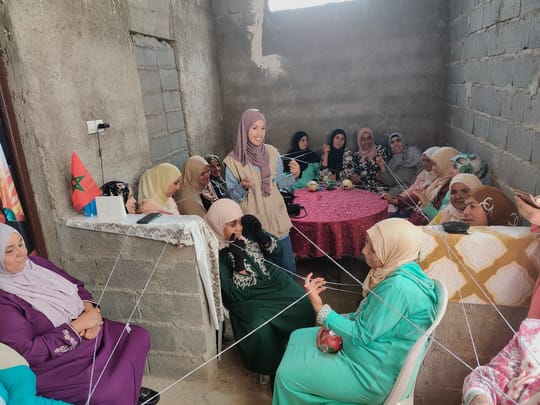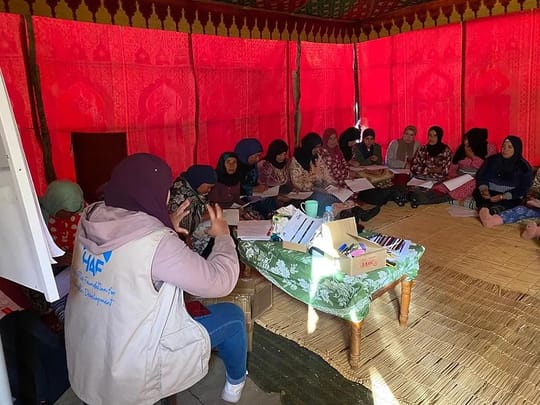Empowering Communities: A Response to Earthquake Trauma in Morocco In the wake of the recent powerful earthquakes

In the aftermath of a devastating 6.8-magnitude earthquake in Morocco, the High Atlas Foundation (HAF) has taken proactive measures to address psychological challenges. Recognizing the urgent need for support, HAF has compiled new manuals and training materials to offer psychosocial assistance, filling a critical gap in post-disaster intervention. The primary objective of this program is to provide psychosocial activities that support and empower earthquake survivors, particularly women and children.
The program’s specific objectives include enhancing the mental health and well-being of women and children impacted by the earthquake in the Atlas Mountains, as well as supporting the mental health of individuals in the affected villages. To achieve these objectives, HAF has outlined several key strategies, involving coordinating with local associations to organize training sessions in safe and accessible spaces for women across different target villages, hiring experienced facilitators to conduct sessions with children, and adapting the training curriculum to fit the context of trauma induced by the earthquake and its consequences.
Implementing these strategies involves organizing weekly training sessions and adapting the curriculum. Additionally, the program emphasizes the importance of hiring experienced staff to conduct sessions, ensuring the quality and effectiveness of the intervention. Moreover, the Empowerment Workshop is a powerful opportunity for participants to bond and build community. Sharing the common experience of surviving an earthquake creates strong connections and solidarity, serving as a source of support during the healing and recovery process.

Given people experiencing depression and trauma post-earthquake, HAF highlights the importance of providing psychosocial sessions to help individuals process their pain while empowering them to envision and create new lives. As the program unfolds, HAF emphasizes the transformative potential of the psychosocial empowerment methodology. By contextualizing it within earthquake recovery, the organization aims to guide individuals not just in healing the past but also in creating a vision for their future. The facilitators aim to instill a sense of agency, enabling people to rebuild their lives and move towards a higher level of purpose.
A total of 775 women and girls and 318 children, both boys and girls, aged between 4 and 11, benefitted from these workshops. Throughout the sessions, a prevalent theme emerged as participants openly shared their experiences of fear, pain, and trauma, particularly those who had lost loved ones due to the earthquake. The wrenching reality that many faced was the inability to be with their dear ones in their final moments, to bid them farewell, and to express love and respect. In the aftermath of such sudden losses, those left behind grapple with intense emotions, including profound sadness, remorse, and guilt. These overwhelming feelings can reach a point where individuals find it challenging to navigate their daily lives. The workshops provided a space for these poignant stories to be heard and acknowledged, fostering a supportive environment for participants to begin the process of healing and coping with the complex emotions that have arisen.
HAF’s response to the aftermath of the earthquake in Morocco reflects a holistic and empowering approach to psychosocial support. By addressing immediate needs and fostering long-term resilience, the organization is not only helping individuals heal but also contributing to the creation of a new paradigm of possibility in the affected communities.